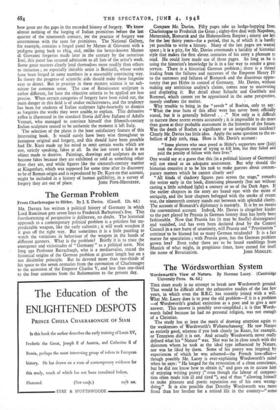The German Problem
From Charlemagne to Hitler. By J. S. Davies. (Cassell. 12s. 6d.)
MR. DAVIES has written a political history of Germany in which Lord Runciman gets seven lines to Frederick Barbarossa's five. This foreshortening of perspective is deliberate, no doubt. The historical approach to a contemporary political problem is a priceless but un- predictable weapon, like the early culverin ; it will work wonders if it goes off the right way. But sometimes it is a little puzzling to watch the variations in behaviour of the weapon in the hands of different gunners. What is the problem? Briefly it is to trace the emergence and vicissitudes of " Germany " as a political term. Not long ago Professor Barraclough, who is a mediaevalist, traced the historical origins of the German problem at greater length but on a not dissimilar principle. But he devoted more than two-thirds of his space to the seven centuries from the coronation of Charlemagne to the accession of the Emperor Charles V, and less than one-third to the four centuries from the Reformation to the present day. Compare Mr. Davies. Fifty pages take us hedge-hopping from Charlemagne to Frederick the Great ; eighty-five deal with Napoleon, Metternich, Bismarck and the Hohenzollern Empire ninety are left for the last thirty years—for a period, that is, of which it is hardly yet possible to write a history. Many of the last pages are wasted space ; it is a pity, for Mr. Davies commands a lucidity of historical style that makes the first eleven centuries of his story a pleasure to read. He could have made use of those pages. So long as he is using the historian's knowledge he is in a fair way to render a great service. There is a historical German problem ; there is a thread leading from the failures and successes of the Emperor Henry IV to the successes and failures of Bismarck and the disastrous oppor- tunity that put Hitler in control of Germany. Mr. Davies, without making any ambitious analyst's claims, comes near to uncovering and displaying it. But detail about Schacht and Goebbels and Rommel, which cannot yet be appreciated in the same perspective, merely confuses the matter.
Why trouble to bring in the " revolt " of Roehm, only to say: "What the true facts of this affair were has never been officially stated, but it is generally believed . . ." Not only is it difficult to narrate these recent events accurately ; it is impossible to do more than guess at their probable assessment in the histories of the future. Was the death of Roehm a significant or an insignificant incident? Clearly Mr. Davies has little idea. Apply the same question to the re- bellion of July 20th, 1944. Here is Mr. Davis's account:
"Some plotters who once posed as Hitler's supporters now (July) took the desperate course of trying to kill him, but they failed and paid the penalty of failure with their lives."
One would say at a guess that this (in a political history of Germany) will not stand as an adequate assessment. But why should the historian conceive it to be his task to make guesses about contem- porary matters which he cannot clearly see?
"All kinds of shadowy figures pass across the stage," remarks the writer early in the book, dismissing pleasantly (but not without casting a little subdued light) a century or so of the Dark Ages. If the earlier chapters in the story are hazed oyer with the mists of antiquity, and the later chapters befogged with the smoke of recent war, the nineteenth century stands out between with splendid clarity. The account of Bismarck's diplomacy is masterly. It is by no means the conventional account. Indeed, Mr. Davies is altogether kinder to the part played by Prussia in German history than has lately been fashionable. Now that Prussia has (it may be finally) disintegrated and vanished, and has even been declared dead by the Control Council in a rare burst of unanimity, will Prussia and " Prussianism " continue* to be blamed for so many German misdeeds? It is a fair matter for speculation; with Prussia gone, has the German problem grown less? Even today there are to be heard rumblings from Munich of what might, in propitious times, have earned for itself


































 Previous page
Previous page